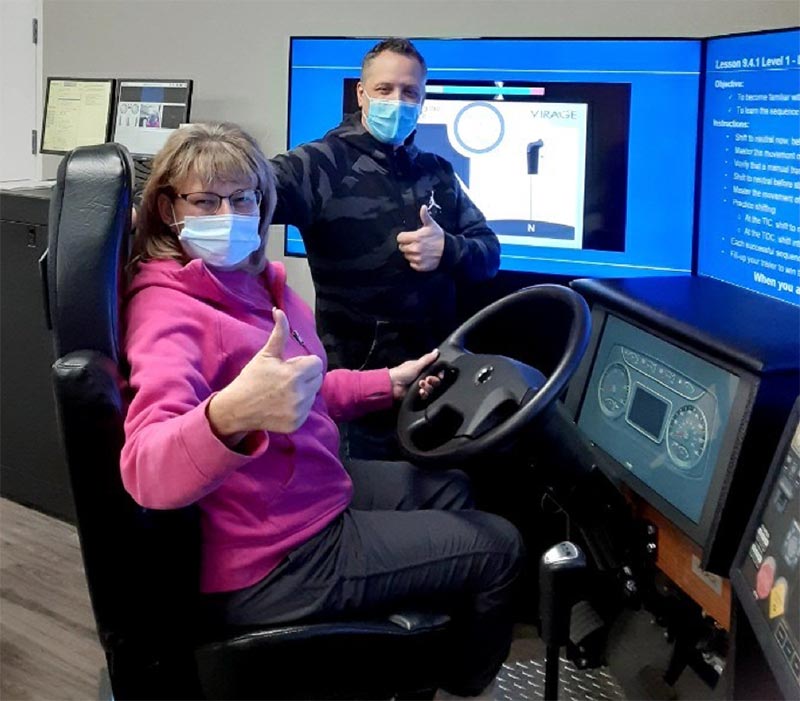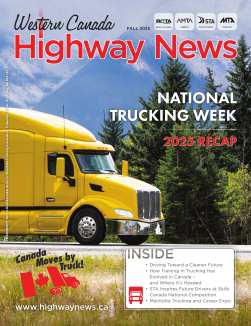
Western Canadian Program Aims to Get More Women into Trucking
March 11, 2021
It’s no secret that women make up a small percentage of the trucking industry’s workforce, but across Western Canada, several organizations have been striving to change that.

Initiatives like the YWCA’s Changing Gears program in B.C.’s Vancouver and Lower Mainland have been tapping into the forgotten half of the labor pool with the ultimate goal of getting more women into trucking.
Not only do such efforts address the lack of adequate female representation in trucking, they also aim to alleviate a key issue within the industry – the driver shortage.
“In 2015, the labor market outlook projected a shortage of truck drivers over the next 10 years,” said Tina Hurd, program manager for the YWCA’s Changing Gears. “There was a labor market need and there were women who could fill those positions, but it hasn’t been easy for women to break into the trucking industry.”
Programs Aim to Attract Women
The YWCA’s Changing Gears program provides the opportunity for women to secure a viable and sustainable career, while at the same time addressing the labor shortage.
Hurd said the industry’s traditional male-dominated approach has created a stereotype that has resulted in women not being encouraged to pursue a career in trucking.
“The YWCA’s Changing Gears program provides the opportunity for women to secure a viable and sustainable career,” she said, “while at the same time addressing the labor shortage.”
In B.C.’s neighboring province, Women Building Futures (WBF) has been offering women in Alberta looking to enter the trades a variety of program options since 1998. Then in 2017, women in the Class 1 driver training class celebrated the program’s first graduation.
The program was created to diversify WBF’s offerings for what they call “underemployed women.” It also helps diversify the workforce in the trucking industry.
Over the years, the Class 1 program has seen steady, increasing demand, and for the first time this year will be offered in Calgary, in addition to Edmonton, where WBF is located.
“We have graduated a total of 41 students from our Class 1 program. Since completing our program, many graduates have moved into leadership roles and continue their advanced training with our dedicated partners,” said Brittany Nugent, WBF manager of communications. “We have seen great interest amongst the general public and the industry as a whole as more people are becoming aware of the employment opportunities and careers that exist in the industry.”
Free Training
WBF’s Class 1 program is an eight-week course that covers a variety of areas, such as air brakes, driving skill development, and load securement, to name just a few.
Like the YWCA’s Changing Gears program, WBF offers Class 1 training to women free of charge thanks to its program sponsors in Edmonton and the Government of Canada’s Women in Construction Fund for those in Calgary.
B.C.’s YWCA offers its program for free thanks to funding from the provincial and federal governments.
“Our programs are ultimately focused on removing barriers and preparing women to succeed,” said Nugent. “Our class sizes are small to ensure our students receive high quality training and the support needed for an entry level role.”
Hurd said the Changing Gears program has made gradual gains since it launched six years ago, and the attitude toward women in trucking has taken a positive turn.
“The formation of the Women’s Trucking Federation of Canada in 2015 has been instrumental in educating the public about women and trucking and in pushing past the obstacles facing women in the industry,” she said. “Other provinces have also become involved in promoting women in the industry – an example being the YWCA Saskatoon recently launching their Women Shifting Gears program.”
The Saskatchewan Trucking Association (STA) played a big role in bringing Women Changing Gears to the province, working with the Ministry of Career Training and Immigration to find ways to attract more people to the industry.
“In doing our research, we stumbled across a B.C. program that was similar and wondered if we could do something like that in Saskatchewan,” said Susan Ewart, executive director of the STA. “Conversations started with the Labour Market Services Branch at the ministry on how we could bring this program to life here. We knew the industry needed more women and if we could somehow attract those individuals, we could start to assist with labor demands in trucking.”
The STA partnered with the YWCA of Saskatoon and received initial funding for 10 students. Despite the hurdles of Covid-19, the program moved forward, and the first group of women are completing their work placements with the hope of landing a full-time position and be on their way to the mandatory entry-level training (MELT) approved driver training school.
Women Shifting Gears

Ewart said programs that get more women into the industry are vital for several reasons, including getting help with tuition costs.
“Currently, individuals wanting to be issued a Class 1/A licence must complete the MELT program, which comes with an approximate price tag of $10,000,” she said. “Programs like Women Shifting Gears demonstrate how government and industry can work together to fill important labor needs while investing into an industry that is critical to Saskatchewan’s economy.”
The province’s program also places and emphasis on targeting unemployed and underemployed women to provide equal opportunities to those who may not receive them otherwise.
There is also the issue of improving the industry’s image.
“We have seen support for Women Shifting Gears as far as the Atlantic Provinces, with industry experts wanting to get involved and see this program succeed,” said Ewart. “We are confident that Women Shifting Gears has provided a valuable experience to our students, who can now confidently approach an employer in trucking and demonstrate their ability to find success as a professional in this industry.”
At this time, Ewart is the lone woman heading up a trucking association in Canada. Though Ewart recognizes this fact, she points out that she is not the only woman working in the industry. She has also learned something about herself along the way.
“My gender should never have a bearing on whether I can be successful at the job or not,” she said. “I do not think that I approach the job any differently than my male counterparts in other provinces. I always thought that my kindness was a character flaw but, as I have grown in my career, I have learned to appreciate that trait in myself and I realize it may be my greatest strength.”
Moving forward, Ewart said so long as trucking companies are looking for quality people, and woman show interest in the industry, there will be a place for them alongside their male counterparts.
Hurd also expects more women to enter the industry as attitudes continue to shift.
“There have always been women who have want to be truck drivers; there just hasn’t been the support,” said Hurd. “The women who have entered the industry over the past six years have paved the way for more women to come. Currently, only 3% of drivers in the trucking industry are women, but based on the response to our program and the movement across Canada to support women in trucking, we expect this percentage to increase in the coming years.”
Western Canada Highway News
Categories | Driver Shortage
Tags | Advocacy, Women Shifting Gears
Related Links
-
Women Shifting Gears, YWCA Registration
Women Shifting Gears is a unique, three-phased program designed to empower women and develop their skills to enter the transportation industry as a Class 1A Professional Truck Transport Driver.





